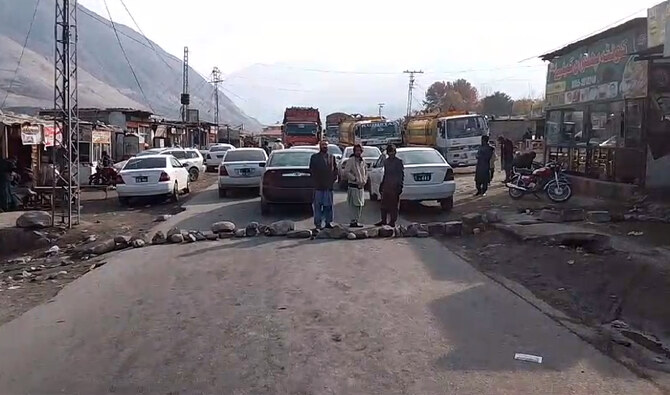KHAPLU, Gilgit-Baltistan: Demonstrators who have been blocking the Karakoram Highway linking the remote northern Gilgit-Baltistan region to the rest of Pakistan to protest the construction of a dam said on Wednesday they would allow the road to be opened for 15 days, giving the government until then to meet demands.
The government plans to build the Diamer-Bhasha dam on the River Indus between Kohistan district in Khyber Pakhtunkhwa province and Diamer district in Gilgit Baltistan by 2028-29. It is estimated that plans to build the dam and reservoir will displace more than 4,200 families in nearby areas. Once constructed, the dam will submerge a large section of the Karakoram Highway to China, Pakistan’s Water and Power Development Authority (WAPDA) estimates.
For the last two days, hundreds of protesters have been blocking the KKH in the Diamer district in protest against WAPDA, whom they say has not paid them compensation for land they gave up for the construction of the dam.
Three rounds of negotiations with the government had failed, Shahid Iqbal, a member of the protesters’ core committee, told Arab News.
“Though all negotiations with the government couldn’t reach a conclusion, we don’t want to disturb the public, that’s why we are opening the road to facilitate commuters,” Muhammad Iqbal, the leader of the protesters’ core committee, told Arab News on Wednesday via telephone from the region.
“And on assurances of the senior superintendent of police, Sher Khan, speaking on behalf of the government, we have extended the deadline for 15 days. The local administration has promised to resolve our issues after consulting with the general manager of WAPDA within 15 days.”
Iqbal said the protest would resume after 15 days if the government failed to meet demands, including the resettlement of those displaced by the dam’s construction as well as financial compensation for affectees.
Speaking to Arab News, the spokesperson of the Gilgit-Baltistan government, Faizullah Faraq, said the government would consider all “valid demands” of protesters.
“Officials from WAPDA, the district administration, and police are representing the government side, while five members of [dam] affectees are taking part in the negotiation process,” Faraq told Arab News.
He said Diamer-Bhasha dam affectees had protested multiple times in the past but their latest move to block the KKH had left “hundreds of passengers stranded on both sides.”
“They have presented their demands and the government will leave no stone unturned to fulfil their valid demands,” the official added.
The $12-$14 billion Diamer-Bhasha dam should generate 4,500 megawatts (MW) of electricity, and a vast new reservoir would regulate the flow of water to farmland that is vulnerable to increasingly erratic weather patterns. With a gross water storage capacity of 8.1-million-acre feet (MAF), the dam is expected to help irrigate 1.23 million acres of additional land.
China and Pakistan signed a memorandum of understanding in December 2016 for Beijing to help fund and develop Pakistan’s Indus Basin dams, though no timelines were released. Pakistan estimates there is 40,000 MW of hydro potential.
Pakistan has been keen for years to build a cascade of mega dams along the Indus flowing down from the Himalayas, but has struggled to raise money from international institutions amid opposition from its nuclear-armed neighbor India.
Those ambitions have been revived by China’s Belt and Road infrastructure corridor for Pakistan, a key cog in Beijing’s creation of a modern-day Silk Road network of trade routes connecting Asia with Europe and Africa.



















